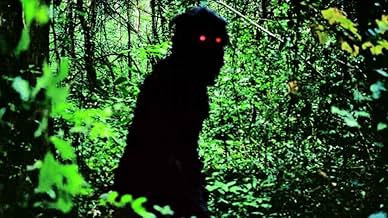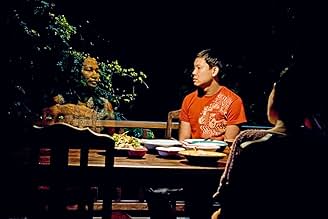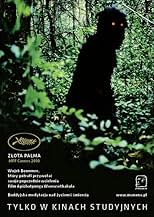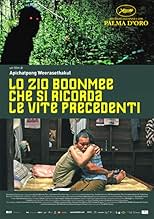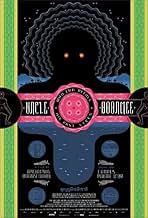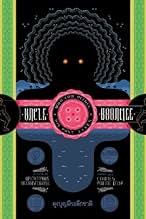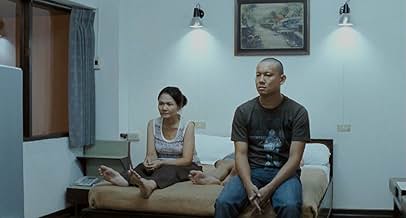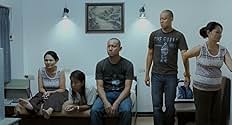Uncle Boonmee erinnert sich an seine früheren Leben
Originaltitel: Loong Boonmee raleuk chat
IMDb-BEWERTUNG
6,7/10
18.392
IHRE BEWERTUNG
Ein Mann, der an einer Nierenerkrankung sterben wird, verbringt seine letzten, düsteren Tage in einem Farmhaus im Norden Thailands mit seiner Familie, zu der auch der Geist seiner verstorben... Alles lesenEin Mann, der an einer Nierenerkrankung sterben wird, verbringt seine letzten, düsteren Tage in einem Farmhaus im Norden Thailands mit seiner Familie, zu der auch der Geist seiner verstorbenen Frau und sein Sohn in Gestalt eines Waldgeistes gehören.Ein Mann, der an einer Nierenerkrankung sterben wird, verbringt seine letzten, düsteren Tage in einem Farmhaus im Norden Thailands mit seiner Familie, zu der auch der Geist seiner verstorbenen Frau und sein Sohn in Gestalt eines Waldgeistes gehören.
- Regie
- Drehbuch
- Hauptbesetzung
- Auszeichnungen
- 11 Gewinne & 25 Nominierungen insgesamt
Kanokporn Tongaram
- Roong
- (as Kanokporn Thongaram)
- …
Empfohlene Bewertungen
I really do wish I could like this. As it is, I think it has some dazzling sequences, and some really atmospheric and hypnotizing scenes. For the most part though, it didn't amount to much for me, and that's because I was just really bored by a lot of it. This really just comes down to whether one is hypnotized or bored by it, and unfortunately for me it was the latter. That doesn't mean that it's an awful film, it has way too much originality in what I saw to label it as such (and whether it has anything to really say is anyone's guess). Still, I wouldn't recommend this to most people, simply because it's so hard to get into. Not recommended.
This movie is meditation, a state of concentration. I only wish I wasn't tired when I saw it last night because my concentration waned, I could feel the movie slipping between my fingers and trying to wilfully sustain the experience can't work. This is a Buddhist film, but it's Thai Buddhist (the form they practice in Thailand came from Sri Lanka and is from the earliest strata of Buddhism), it's spiritual but it's not esoteric in the manner of the Tibetans, ancient but not arcane. It's not Buddhist because Boonmee may or may not be recalling on his deathbed his past and future lives, or because there are ghosts and demons and a talking catfish, this is colorful lore, the illusory flowers of mind. It's Buddhist because it's aware of the moment. Not so strangely, it's the fantastical bits that seem to make the film watchable for most people, yet if we come to this film to satisfy our need for something to happen, we break the spell. The spell here for me is the awareness of life as is, the clear vision of a heaven in the present world.
Here's a camera that doesn't describe a world, it allows it to emerge in its own time. Sometimes this tests my patience but I appreciate that it doesn't make amends and concessions. Cessation, stillness of mind, true perception, these are all vital and desirable here, and they can only happen in their own time, they can't be forced. I appreciate that and I appreciate the limitations of my own viewing. In those moments that my eyes and the movie adjust, I am blissful. Two moments exemplify this, the one is a table out in the verandah by night, insects buzzing around a light and everything is quiet, this is the summer night for me. The other is Uncle Boonmee lying down on a bed in his honeykeeping shed, it's noon and crickets are humming from the trees, this is the summer day. It reminds me of the remembrance of spring in Kiarostami's The Wind Will Carry Us.
The finale is rather interesting, despite the above. A lot of viewers seem to regard it as Weeresethakul's comment on the alienation fostered by the niceties of modern society. It is its own comment on the place of Buddhism in one such society, where the garments of the monk mean nothing, but instead of inferring that a day's hard work out in the open is preferable to watching TV Weeresethakul could have not made a movie to begin with (that calls for us to sit alone from one another in a dark room where flickering lights are projected).
But I don't think that such a simple conclusion was what was intended. I see vision that wants to encompass the world of ambiguities. The family may be sitting in the silent, staring at a box, but I got the sense of quiet warmth coming from the simple togetherness, a certain soothing affect that is possible only in people who can sit together without a need for words. Who can relax simply in the presence of each other.
This is valuable work, and I believe it will be cherished by viewers who feel the chakras of cinema should be purified and set ablaze now and then.
Here's a camera that doesn't describe a world, it allows it to emerge in its own time. Sometimes this tests my patience but I appreciate that it doesn't make amends and concessions. Cessation, stillness of mind, true perception, these are all vital and desirable here, and they can only happen in their own time, they can't be forced. I appreciate that and I appreciate the limitations of my own viewing. In those moments that my eyes and the movie adjust, I am blissful. Two moments exemplify this, the one is a table out in the verandah by night, insects buzzing around a light and everything is quiet, this is the summer night for me. The other is Uncle Boonmee lying down on a bed in his honeykeeping shed, it's noon and crickets are humming from the trees, this is the summer day. It reminds me of the remembrance of spring in Kiarostami's The Wind Will Carry Us.
The finale is rather interesting, despite the above. A lot of viewers seem to regard it as Weeresethakul's comment on the alienation fostered by the niceties of modern society. It is its own comment on the place of Buddhism in one such society, where the garments of the monk mean nothing, but instead of inferring that a day's hard work out in the open is preferable to watching TV Weeresethakul could have not made a movie to begin with (that calls for us to sit alone from one another in a dark room where flickering lights are projected).
But I don't think that such a simple conclusion was what was intended. I see vision that wants to encompass the world of ambiguities. The family may be sitting in the silent, staring at a box, but I got the sense of quiet warmth coming from the simple togetherness, a certain soothing affect that is possible only in people who can sit together without a need for words. Who can relax simply in the presence of each other.
This is valuable work, and I believe it will be cherished by viewers who feel the chakras of cinema should be purified and set ablaze now and then.
When it comes to art films, there's always been a divide. More casual viewers are more likely to dismiss a lot of them as pretentious and stupid, film buffs are more likely to find them beautiful and above anything you'll spend ten to fifteen to watch in a multiplex today. "Uncle Boonmee Who Can Recall His Past Lives" is one of those films, however, that even divides film buffs amongst themselves. Despite winning Palme D'or, the film has many detractors, and a 6.6 on this site(as of this review). 6.6 isn't bad but far below what you would expect given some of the praise. So, what IS this film exactly?
The title character is a man who is slowly dying, living out with his family for his remaining days. Those days become consumed by flashbacks to past lives (though it's not always clear what that life is or how it relates), being visited by the ghost of his wife, and trying to plan for his after life. The film has a very loose structure. Many people find the pace unbearably slow, I think in part because the film doesn't really build up to anything. To call this film meditative would not be a hyperbole, it's a mellow kind of movie. After watching it, I felt different, like I had been given the world's greatest massage, my muscles loosened up and everything, it's not like anything I've gotten from a movie before. This is helped by the beautiful scenery and cinematography. This is a movie that, if you can't watch it on a big screen with loud speakers, should at least be watched in a dark room with headphones if watching on a laptop/desktop. There's little in way of soundtrack (except for one beautiful song later in the film), but the sounds of nature are beautifully captured.
The actual narrative is composed of many smaller stories, all of which connect with Boonmee. All of them work on their own level, and together do create a low key but very, very touching film. the scene where Boonmee talks to the spirit of his wife about the anxiety he used to have giving speeches may be the highlight there, though the princess story and the final flashback are also up there.
This is a film you have to watch on it's terms. You have to be willing to watch it as a more meditative kind of experience, to simply enjoy it the way one might enjoy a hike in the woods of a car ride. If that's not what you want out of a film, avoid this at all costs.
For me, personally, I was a little hesitant going in, given how divided opinion was, but I'm glad I did, and will certainly watch again. It's a powerful film. It won't necessarily leave you in tears, but it will likely leave an impression on those who gravitate towards things like this.
The title character is a man who is slowly dying, living out with his family for his remaining days. Those days become consumed by flashbacks to past lives (though it's not always clear what that life is or how it relates), being visited by the ghost of his wife, and trying to plan for his after life. The film has a very loose structure. Many people find the pace unbearably slow, I think in part because the film doesn't really build up to anything. To call this film meditative would not be a hyperbole, it's a mellow kind of movie. After watching it, I felt different, like I had been given the world's greatest massage, my muscles loosened up and everything, it's not like anything I've gotten from a movie before. This is helped by the beautiful scenery and cinematography. This is a movie that, if you can't watch it on a big screen with loud speakers, should at least be watched in a dark room with headphones if watching on a laptop/desktop. There's little in way of soundtrack (except for one beautiful song later in the film), but the sounds of nature are beautifully captured.
The actual narrative is composed of many smaller stories, all of which connect with Boonmee. All of them work on their own level, and together do create a low key but very, very touching film. the scene where Boonmee talks to the spirit of his wife about the anxiety he used to have giving speeches may be the highlight there, though the princess story and the final flashback are also up there.
This is a film you have to watch on it's terms. You have to be willing to watch it as a more meditative kind of experience, to simply enjoy it the way one might enjoy a hike in the woods of a car ride. If that's not what you want out of a film, avoid this at all costs.
For me, personally, I was a little hesitant going in, given how divided opinion was, but I'm glad I did, and will certainly watch again. It's a powerful film. It won't necessarily leave you in tears, but it will likely leave an impression on those who gravitate towards things like this.
I just finished watching this movie for the second time. I saw it twice because I was torn between making the decision of whether it was absolute garbage, or a work of genius. It's pretty much garbage. Sorry.
Picture this: you download some pictures of Thai forests and caves from National Geographic. You then download "Forest Sounds Vol. 2". You play a slide-show of these pictures whilst listening to the ominous and atmospheric sounds of the jungle. After about 10 minutes, you stop what you're doing and sit in a corner for an hour and a half. Then, you go back to your slide-show and sound effects for another 10 minutes. This is the movie in a nutshell.
There are some beautiful shots within the movie, and it's obvious there was some talent because they make a point to keep these still shots on the screen for as long as possible. The background sounds add a lot to the movie as well, but everything else was just plain bad. All of the acting was quiet and monotonous, and it didn't make it seem more natural at all.
The dialogue was terrible. Nothing made sense. As much as I would love to be even more pretentious about movies than I already am, and rave about how people don't understand this movie, there actually is really nothing to understand. All of the characters were the same. Any subtleties within them are just projections of the viewer filling in the blanks, and believe me, they are blank.
The majority of the movie was filler.
Garbage.
Picture this: you download some pictures of Thai forests and caves from National Geographic. You then download "Forest Sounds Vol. 2". You play a slide-show of these pictures whilst listening to the ominous and atmospheric sounds of the jungle. After about 10 minutes, you stop what you're doing and sit in a corner for an hour and a half. Then, you go back to your slide-show and sound effects for another 10 minutes. This is the movie in a nutshell.
There are some beautiful shots within the movie, and it's obvious there was some talent because they make a point to keep these still shots on the screen for as long as possible. The background sounds add a lot to the movie as well, but everything else was just plain bad. All of the acting was quiet and monotonous, and it didn't make it seem more natural at all.
The dialogue was terrible. Nothing made sense. As much as I would love to be even more pretentious about movies than I already am, and rave about how people don't understand this movie, there actually is really nothing to understand. All of the characters were the same. Any subtleties within them are just projections of the viewer filling in the blanks, and believe me, they are blank.
The majority of the movie was filler.
Garbage.
Incoherent, unpredictable, mystical, yet undoubtedly original, "Uncle Boonmee Who Call Recall His Past Lives" is a pseudo-profound cinematic venture that reeks with allegory and mythical undertones. After watching this film, I've come to a conclusion that it is certainly not for everyone.
Despite its strange recurring themes about supernatural beings, spirits, Buddhist philosophy, karma, and reincarnation, it will bathe you with its gentleness and natural ornateness. It is intimate and surprisingly elegant, though not without its flaws.
Much like Terrence Malick's "Tree of Life," this motion picture lacks a linear narrative. It doesn't have what most of us would require from a movie: a plot. It heavily relies on hypnotic images captured into still wide frames that often drag longer than the easily-bored viewer can bear.
Then there's the noticeable absence of a musical score. You never get to hear music until the last few minutes of the film; all you'll hear besides the dialogues are crickets, the rustling of leaves, a water buffalo, the sound of an electric fly swatter zapping flying bugs, footsteps, a waterfall, and a talking catfish that made love to a disfigured princess.
Simple and ambitious; primitive and modern; eerie and comforting; senseless and driven; and dull and brilliant, this Thai film gives you a one-of-a-kind viewing experience. If you are into esoteric art films, this is something I would highly recommend. If you loathe movies that seem to have no meaning, then this is not for you.
Confounding as it is, "Uncle Boonmee..." is a film that doesn't need to be understood; it simply has to be FELT.
Despite its strange recurring themes about supernatural beings, spirits, Buddhist philosophy, karma, and reincarnation, it will bathe you with its gentleness and natural ornateness. It is intimate and surprisingly elegant, though not without its flaws.
Much like Terrence Malick's "Tree of Life," this motion picture lacks a linear narrative. It doesn't have what most of us would require from a movie: a plot. It heavily relies on hypnotic images captured into still wide frames that often drag longer than the easily-bored viewer can bear.
Then there's the noticeable absence of a musical score. You never get to hear music until the last few minutes of the film; all you'll hear besides the dialogues are crickets, the rustling of leaves, a water buffalo, the sound of an electric fly swatter zapping flying bugs, footsteps, a waterfall, and a talking catfish that made love to a disfigured princess.
Simple and ambitious; primitive and modern; eerie and comforting; senseless and driven; and dull and brilliant, this Thai film gives you a one-of-a-kind viewing experience. If you are into esoteric art films, this is something I would highly recommend. If you loathe movies that seem to have no meaning, then this is not for you.
Confounding as it is, "Uncle Boonmee..." is a film that doesn't need to be understood; it simply has to be FELT.
Wusstest du schon
- WissenswertesShot on 16mm film rather than digital. Director Apichatpong Weerasethakul wanted to film in this format as the film is all about dying traditions.
- PatzerThe first time a ghost appears, during dinner, the nephew passes the ghost a glass of water. You can see the ghost image superimposed over the nephew's arm when he places the glass of water on the table.
- VerbindungenFeatured in At the Movies: Cannes Film Festival 2010 (2010)
Top-Auswahl
Melde dich zum Bewerten an und greife auf die Watchlist für personalisierte Empfehlungen zu.
- How long is Uncle Boonmee Who Can Recall His Past Lives?Powered by Alexa
Details
- Erscheinungsdatum
- Herkunftsländer
- Offizielle Standorte
- Sprachen
- Auch bekannt als
- Uncle Boonmee Who Can Recall His Past Lives
- Drehorte
- Produktionsfirmen
- Weitere beteiligte Unternehmen bei IMDbPro anzeigen
Box Office
- Bruttoertrag in den USA und Kanada
- 184.292 $
- Eröffnungswochenende in den USA und in Kanada
- 23.540 $
- 6. März 2011
- Weltweiter Bruttoertrag
- 1.214.424 $
- Laufzeit1 Stunde 54 Minuten
- Farbe
- Sound-Mix
- Seitenverhältnis
- 1.85 : 1
Zu dieser Seite beitragen
Bearbeitung vorschlagen oder fehlenden Inhalt hinzufügen

Oberste Lücke
What is the Hindi language plot outline for Uncle Boonmee erinnert sich an seine früheren Leben (2010)?
Antwort

